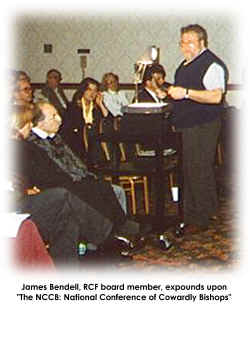
FOR IMMEDIATE RELEASE
Crying the Alarm
Roman Catholic Faithful, Inc.
Anaheim Conference
Addressing Catholics from the Los Angeles and Orange County area, Roman Catholic Faithful, Inc. hosted a marathon conference of nine back-to-back talks on February 28, 1998. Steven Brady, founder of the group, flew in from Springfield, Illinois to introduce southern Californians to the work of his organization. Brady told the heart-rending stories of the two most recent people to step forward and expose the sexual misconduct of Bishop Ryan of Springfield, who has been a long-standing target of RCF concern. RCF became involved in an investigation of Bishop Ryan’s behavior when the organization was approached by two priests complaining that the Bishop had sexually harassed them.
The Springfield diocese angrily dismissed RCF in a statement issued to a local newspaper, which referred to RCF activists as "ignorant" people. This remark caught the attention of a woman who felt the time had come for her to reveal what she knew about the Bishop’s behavior. The woman was a reformed prostitute, who had returned to college and to the Catholic Church in an heroic struggle to bring her life under control. In her darker years, however, she had been among a circle of "intimates" who were sought out by Bishop Ryan.
One of these people is a former male prostitute and drug addict who is dying of AIDS. This 30-year old man also has returned to the Church and wishes to make the remaining years of his life as honest and useful as he can. To do this, he feels that he must speak publicly about the predatory activities of Bishop Ryan.
Brady is sensitive to the fact that RCF’s aggressive investigations are perceived as "witch hunts" by some. He feels they are valid and necessary, however, given the reluctance or the inability of the American Catholic hierarchy to remove offenders from positions of authority. Brady’s second talk outlined the methods of public inquest and disclosure that RCF uses, and he encouraged southern Californians to work with him to reestablish a more holy Church institution.
William Del Castillo-Reyes, a Jesuit-educated Cuban immigrant now living in Florida, gave the second talk of the conference on the problems faced by Spanish-speaking people in the United States. He described from first-hand experience the enormous pressure of the immigrant to assimilate culturally and spiritually. Del Castillo-Reyes described the bitter persecution of his orthodox Cuban community at the hands of a liberal American priest who mistrusts and opposes its traditional piety. This is a bewildering problem for the immigrant who is hampered by language barriers and a host of insecurities. He is frequently unable to distinguish between the problems caused by rebellious religious and those caused by his own difficulties in a strange land. Del Castillo-Reyes’ remarks drew a strong, resonant sympathy among conference attendants from other ethnic groups who also felt that their Catholicism had been seriously challenged by the American Catholic Church. One Filipino expressed the great relief she felt at being among other, faithful Catholics at the RCF Conference.

Bendell’s second talk highlighted the work of Sister Fran Ferder, who is an advocate for accepting homosexuality as a healthy, normal sexual alternative. Ferder was a speaker at the 1998 Religious Education Congress, held annually by the Los Angeles Archdiocese. The Congress has become a platform for dissenting Catholic speakers. Bendell’s thesis, however, was that "dissent" is too respectful a term. He preferred to call the various un-Catholic positions expressed by Ferder as heresies. Bendell read passages from Ferder’s writing that appeared to deny Christ’s freedom from concupiscence, that demonstrated her promotion of women priests, that expressed her conviction that the Bible does not condemn homosexual acts, that exposed her contempt of therapeutic attempts to change homosexual orientation (which she called "anti-Christian"), and that showed her explicit contradiction of the Catholic Catechism in her teaching that homosexuality is not sexually disordered. These, said Bendell, are heresies, not simply dissenting opinions.
Stephanie Block, a writer from New Mexico, spoke about the schism within the Catholic Church. Citing the Los Angeles Archdiocese, she pointed out Call to Action efforts to create a Common Ground Dialogue. These efforts, Block believes, are a deceptive maneuver to create an illusion of legitimacy for heretical opinions. Describing Common Ground workshops offered by Father Richard Rohr in New Mexico, and which he also has conducted in California, Block told how Rohr had defined "common ground" on the issue of homosexuality as being support for monogamous homosexual unions.
Dr. Thomas Droleskey from New York, publisher and editor of Christ or Chaos, gave a fascinating history of the "Americanism" which has infected the Catholic Church. This "Americanism" includes a strong disinclination to evangelize the Faith and explains the pressure immigrant Catholics feel to assimilate into the dominant melting pot of culture. It is a root error that must be overcome by the Church before it can adequately flourish in the United States.
Dr. William Marra, professor emeritus from Fordham University and co-founder of Catholics United for the Faith, flew in from Connecticut. Marra, developing an idea from Blaise Pascal, said that while it is wrong to cry an alarm when the times are at peace, if the times are distressed, it would be wrong not to cry the alarm. Marra saw the Church as existing in just such a time of intense distress, and exhorted participants of the RCF Conference to take up the cry of alarm.
Faithful Catholics cannot be satisfied merely to recognize clerical abuses and sanctioned heresy. They must be prepared to show fellow Catholics what the Faith is, as the Church teaches in Her catechism, and they must be prepared to offer resistance to blatant error. The practical intention of the Roman Catholic Faithful, Inc. Conference was to take up this cry of alarm within the Archdiocese of Los Angeles as it has been taken up in Springfield. The alarm has been sounded.

